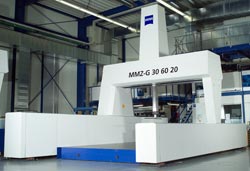Measuring Technology from Carl Zeiss Optimizes the Use of Wind Power

MMZ G coordinate measuring machine: quickly and highly precisely measure large parts by scanning.<br>
Carl Zeiss supports the rising quality requirements for components for wind turbines with highly precise MMZ 3D coordinate measuring machines.
Carl Zeiss offers the MMZ G with measuring volumes of up to 4,000 x 8,000 x 4,000 mm, and thus corresponds to the trend towards ever larger parts. Equipped with a rotary table, it is possible to measure cylindrical parts and gear wheels, including the full mathematical compensation for eccentricity and wobbling movement.
Rotary tables with a diameter of up to 2000 mm and a load capacity of up to eight tons are optionally available. GEAR® PRO software permits measurement of gears without a rotary table.
CAD-based CALYPSO® measuring software and VAST® technology deliver form, size and position information, and can determine the roundness of parts in a single measuring run.
The highly accurate VAST gold active scanning probe also enables measurement of deep-lying geometric elements; it can accommodate extensions up to 1000 mm. Therefore, this scanning technology is ideal for complex part geometries and automated CNC measuring runs.
If features have to be inspected in different orientations and positions, the RDS articulating probe holder further increases measuring efficiency – with more than 20,000 stylus positions at 2.5 degree increments.
Media Contact
More Information:
http://www.zeiss.com/imtAll latest news from the category: Corporate News
Newest articles

First-of-its-kind study uses remote sensing to monitor plastic debris in rivers and lakes
Remote sensing creates a cost-effective solution to monitoring plastic pollution. A first-of-its-kind study from researchers at the University of Minnesota Twin Cities shows how remote sensing can help monitor and…

Laser-based artificial neuron mimics nerve cell functions at lightning speed
With a processing speed a billion times faster than nature, chip-based laser neuron could help advance AI tasks such as pattern recognition and sequence prediction. Researchers have developed a laser-based…

Optimising the processing of plastic waste
Just one look in the yellow bin reveals a colourful jumble of different types of plastic. However, the purer and more uniform plastic waste is, the easier it is to…



